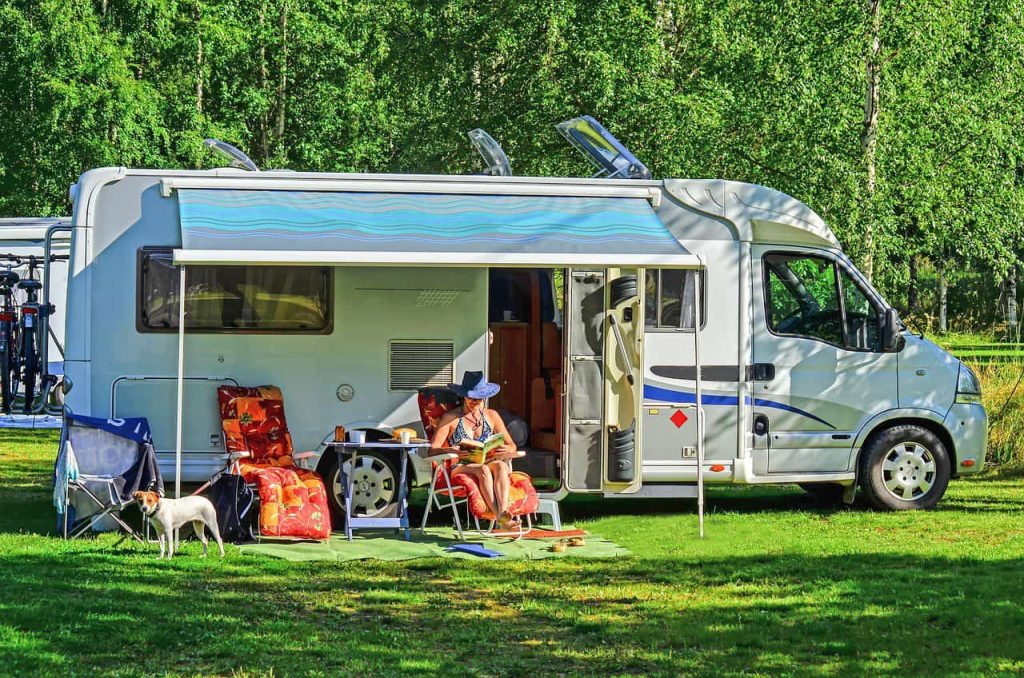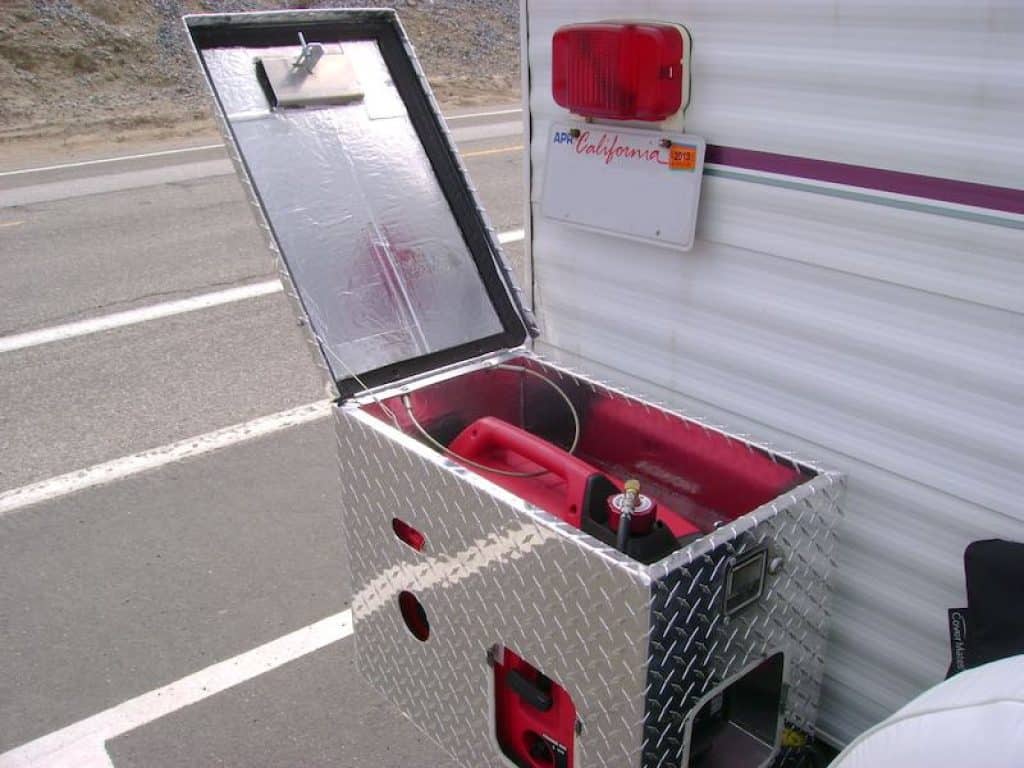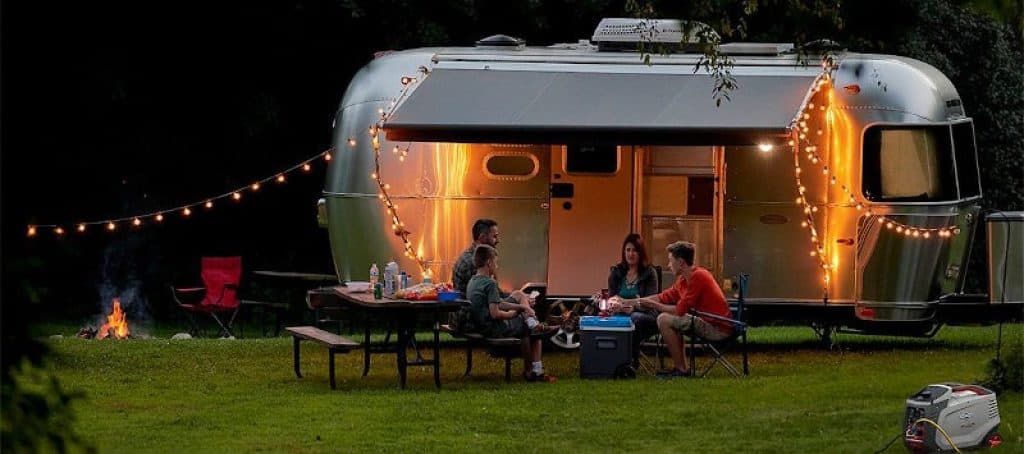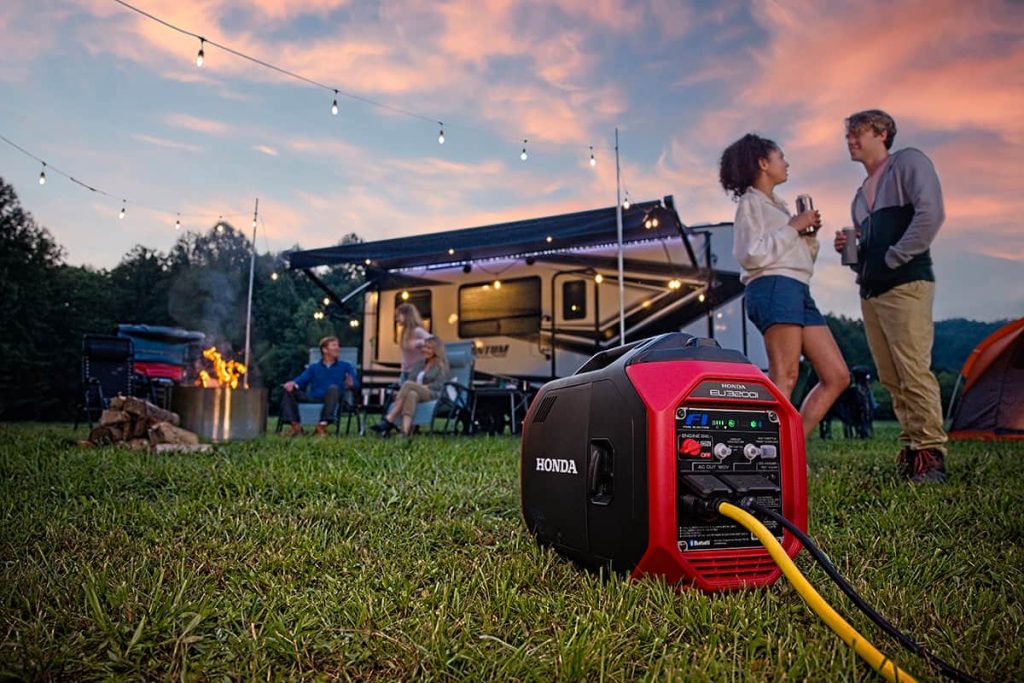
For those who love hitting the road in their motorhomes like me, it’s no secret that having access to reliable power sources is critical for comfort during long travels. Portable generators are an excellent solution but need proper handling procedures to guarantee safe usage throughout your RV trip. After all, safety should always come first for any vacationer!
In this article, we’ll explore vital precautions required when operating a portable generator safely while cruising with your motorhome across the country; from comprehending how various types function down to adequate storage techniques.
Notably, using portable generators for RV travel comes with several safety considerations; adhering to our tips and guidelines promises a vacation experience thats free of stress and worry.

Location Matters: Ideal Generator Placement For RV Safety And Functionality
As you prepare to embark on an RV adventure with a portable generator, it’s important to take some key factors into account when deciding where to place it. Two vital considerations are noise control and fuel selection – both of which play a crucial role in ensuring safe and reliable operation throughout your travels.
When it comes to noise control, choosing the right location is the key. Generators can produce quite a bit of noise over time, which can be both tiresome and dangerous if not properly managed. By selecting a spot for your generator that minimizes its noise output, as much as possible while still allowing for functionality you'll ensure maximum comfort and safety during your travels. Additionally, proper fuel selection is essential for safe operation of any portable generator while traveling by RV. Make sure you’ve researched the type of fuel required by your specific model ahead of time and follow all manufacturer instructions carefully when storing or using the fuel. Perhaps, most importantly, always keep safety top of mind when dealing with gasoline or other fuels inside an RV.
Given the potential fire hazards associated with keeping such substances inside a vehicle like this one (even temporarily), it’s best practice to locate your fuel source outside at all times. Finally, protecting it against weather- or electrical-related damage is another important consideration when setting up your portable generator in an RV.
By taking steps to safeguard it from these common hazards, you’ll ensure that everything runs smoothly and efficiently throughout your journey. It’s essential for any RVer who plans on using a portable generator to prioritize safety precautions from the get-go – starting with quality covers and extension cords that can help protect against weather-related damage or hazardous electrical shorts caused by insufficient insulation or poor wiring practices.
However, protecting yourself goes beyond just equipment maintenance – proper ventilation plays a critical role in minimizing risks associated with running a generator inside an enclosed space like an RV.
Ventilation Focus: Preventing Co Hazards While Running Generators In RVs

Exploring the great outdoors with an RV in tow is a thrilling adventure – but before you take off into the sunset with a portable generator humming away in the background make sure you’ve taken all necessary precautions to ensure safe operation. One major risk is carbon monoxide poisoning – which can be lethal if not detected early enough.
Thats why installing CO detectors throughout your RV is absolutely essential.
But there are other concerns too: noisy exhausts can disrupt sleep patterns and cause health issues over time if generators are improperly sized or installed too close to sleeping quarters. Furthermore ensuring adequate ventilation around your generator – via open windows or fans – is key to preventing build up of harmful fumes inside your rig.
Of course, proper fuel safety must also be taken into consideration when operating generators in an enclosed space like an RV. Be sure to check fuel levels frequently storing extra supplies outside of the vehicle at all times.
And don’t neglect cooling systems either! In some instances, additional vents or fans must be installed to keep temperatures under control during sustained use. By following these best practices and staying alert for potential hazards at all times on the road you can enjoy smooth sailing (or driving!) with a portable generator powering your every need along the way. Don’t overlook the importance of protecting your RV electronics from power surges. After diligently preparing and maintaining your vehicle, it’s time to invest in a portable generator for added safeguarding.
Power Surge Prevention: Safeguarding RV Electronics With Portable Generators

With portable generators being pivotal for maintaining power during RV traveling, it’s essential to observe several important precautions to guarantee safe and effective use.
Power surge prevention, noise mitigation, fuel conservation, overload safety checks and regular maintenance are all crucial components when operating these appliances.
To prevent unexpected shutdowns or overloads from causing power surges in connected appliances or devices in your RV, installing a transfer switch between your generator and key items can help prevent these incidents.
Keeping noise levels below unacceptable thresholds is also important- keeping the generator at a distance from living areas while using materials such as foam or rubber mats to absorb sound waves projected by the unit can help eliminate needlessly loud noise levels.
Fuel conservation is another vital consideration during operation- ensuring that only fresh fuel is used while also adhering to manufacturer recommendations for oil changes promote not only best performance but also longevity against potential damage due to fuel degradation.
Lastly, ensuring that all appliances being used are rated within your generator’s capacity will maintain overload safety status while reducing potential hazards during use.
When it comes to using a generator safety should always be top of mind. That means calling in an expert electrician to inspect your equipment before use ensuring proper wiring and operation.
And let’s not overlook fuel handling – taking care in this area can greatly enhance performance while on the go.
Fuel Handling: Proper Storage And Use Of Fuel For Rv Generator Safety
I’m sure you already recognize how hazardous working with fuels can be. Hence, why it’s critical that you fully comprehend the precise protocols involved with properly storing and utilizing fuels concerning your RV generator.
Safety should never be compromised. Make it a priority to always adhere to established guidelines when handling gasoline regardless of whether its an engine or any other type of fuel-powered machinery. In terms of your generator, remember that using high quality gasoline is paramount in preventing issues ranging from mild malfunctions to serious hazards.
Thankfully, there are different ways of ensuring consistent fuel quality over time – such as poring over and enacting specific stabilization techniques – which prevent the fuel from breaking down and causing mechanical failures. Moreover, having adequate filtration mechanisms is key when safeguarding your generator against poor quality gasoline damage during extended usage periods.
Always err on the side of caution when operating any type of gas powered equipment. Familiarize yourself with all relevant safety measures and regulations pertaining solely to your RV generators specific fuel safeguards.
With our discourse on safe fuel handling concluded, let us delve into both grounding measures and GFCIs – vital components that play a major role in upholding electrical safety within an RV context.
Grounding And GFCIs: Ensuring Electrical Safety In Your RV Setup

Driving around in an RV offers unmatched flexibility for adventure seekers who want to explore nature’s beauty closely. However, having fun shouldn’t compromise safety, especially when it concerns electrical devices like generators.
Grounding systems and GFCIs ensure safe fuel handling preventing electric shock from faulty wiring while insulating against sparks that might ignite vapor from fuel sources. But before buying an RV generator, ensure it has been sized appropriately keeping in view all local electrical codes as getting it retrofitted later on can lead to considerable issues.
Generators can produce loud sounds during operation which can not only disturb others camping nearby but also harm the wildlife around, so consider investing in noise-reducing materials or enclosures.
Finally, outdated wiring could potentially cause short circuits that might damage equipment or worse, start a fire. Be sure to have a wiring system that is up-to-date and properly grounded so your RV adventure remains safe and orderly.
The safety of RV travelers cannot be overstated, and it is imperative to take necessary precautions. One crucial factor is securing all connections tightly to prevent any possibility of open wires being exposed, leading to electrocution hazards.
Having already discussed grounding and GFCIs, let’s delve into the safest ways for RV travelers to distribute power through extension cords.
Extension Cord Best Practices: Safe Power Distribution For RV Travelers
The freedom of RV travel is something that appeals to many – the possibilities are endless!
What we don’t often consider however, is how essential power sources are along the way. It is easy enough to pack gadgets and electronics but providing them with reliable energy while on the go requires some careful considerations especially when extension cords are involved. First things first – proper sizing of extension cords helps prevent overloading which can lead to unforeseen hazards such as overheating and sparking, even fires!
So what’s recommended? An 8 gauge or thicker wire should be used for 15 amp circuits whilst a 10 gauge or thicker wire should be used for 20 amp circuits.
Then comes electrical noise interference which shorter cords help reduce however adding duct tape around the cord will also do wonders! Imagine enjoying natures sounds without any added background noise – pure bliss! Finally, running your portable generator continuously for more than six hours at a time isn't advisable so let it rest awhile before starting again – trust us it'll thank you! Ultimately by keeping these tips in mind you'll be able to enjoy powering up with extension cords safely on any RV trip you take.
Hitting the road in your RV can be an amazing adventure – but only if you're taking all necessary precautions when it comes to powering your vehicle with a generator! One of the most crucial considerations here involves controlling noise levels, after all, nobody wants their peaceful camping experience interrupted by loud machinery!
Additionally, being attentive to how long your generator runs is important for avoiding damage or overuse issues that could derail your travels unexpectedly. By taking these steps into account together we can ensure that our power distribution system remains safe and secure throughout our journey – no matter what awaits us down the road! Just remember: ongoing maintenance will play a vital role in keeping everything working as intended.Regular Maintenance: Keeping Your Rv’s Portable Generator In Top Shape
Maintaining your RVs portable generator regularly is a vital component of traveling safely on the road. A well functioning machine will provide reliable power throughout your expedition.
Below are several guidelines for keeping your generator in excellent condition:
When it comes to storage solutions choose a well ventilated area away from any flammable materials. Ensure that you’re using the proper fuel type for optimal safety and efficiency reasons concerning unit models.
Also, prioritize electrical safety measures while managing noise levels when employing a portable electric source for optimum vitality en route or parked at an RV park site. Routinely inspect cords’ quality guaranteeing appropriate grounding procedures uphold local noise level regulations to avoid violations during camping trips. Lastly, its essential to monitor the air quality surrounding a running generator to avoid dangerous exhaust fumes that lead to health problems.
Following these guidelines from the beginning will ensure secure and smooth travels while leveraging the power of your RVs portable generator. While we continue lets look at weather awareness and how you can safely operate generators under differing RV travel circumstances.
Weather Awareness: Safely Operating Generators In Various RV Travel Conditions
Venturing out into nature via an RV trip requires careful preparation to ensure you stay safe throughout your travels—especially when it comes to operating generators while on the road. Weather conditions can have a significant impact on how you use this equipment safely so its essential always to remain vigilant about precautions like fire prevention measures and reducing noise pollution in RV campgrounds.
To create optimal safety conditions while operating a portable generator on the go, you must follow specific guidelines issued by manufacturers. It’s vital not to store fuel near sources of ignition such as open flames or electrical wiring equipment before starting up this device.
Another key aspect of maintaining proper safety standards involves avoiding moisture from entering into generators while navigating adverse weather environments like rain or snowfall outdoors.
By staying vigilant about these environmental factors and following critical steps towards safety enhancement measures travelers can ensure their trips are smooth sailing from start to finish. Finally, maintaining low noise levels when using this equipment in crowded RV campsites helps establish an atmosphere conducive for all travelers seeking solace and relaxation in nature.
Always respect local guidelines that outline when to reduce noise levels during quieter hours while avoiding long generator use during peak hours of activity. As we delve into the topic of quiet operation and respecting others by limiting generator use its crucial to bear in mind that showing consideration for your fellow campers is paramount. When embarking on a journey with a portable generator in your RV adhering to safety measures is absolutely necessary.
Quiet Operation: Respecting Fellow Campers With Low-Noise Generator Use
Imagine gazing upon stunning natural views while immersed in the calmness of RV camping only to have all this seclusion jarringly disrupted by boisterous generators. As people who care about creating peaceful environments for ourselves and others we must minimize noise levels at every opportunity.
Following low decibel tips guarantees this outcome for everyone enjoying campground trips.
Opting for soundproofing solutions like installing silencers or sound baffles around your power source drastically reduces its noise output regardless of how close it might be to other campers’ sites – something crucial during nighttime hours especially when people are trying to rest after an eventful day.
Looking for alternative sounds like waterfalls or wind chimes to accompany the hum of your generator can add a gentle ambiance that drowns out any potential background noise. Practicing responsible noise control tactics while operating generators is equally important.
It is essential to set up in an area far from other campers and minimize the use of extraneous lights or fans while the generator is running. These simple steps increase everyones chances of having a wonderful time at the campground without disruption by loud noises.
Training And Education: Ensuring Rv Traveler Awareness For Safe Generator Operation
Proper operation of an RV generator is crucial for any responsible camper. It’s not enough to just respect our fellow travelers—we must also educate ourselves on the essentials.
Training ourselves on material handling, noise reduction, fuel sources, safety protocols, and emergency preparedness will guarantee the safe use of our portable generators while traveling. Heres a quick rundown of each topic:
- Material Handling: Take note of your generators weight and size before moving it.
- Noise Reduction: Keep noise levels low when using your generator.
- Fuel Sources: To avoid dirty engines always choose clean fuels.
- Safety Protocols: Follow industry standards for safe operation
- Emergency Preparedness: Be equipped with all emergency supplies needed. Making sure that every operator understands these topics is vital in ensuring that everyone enjoys their travels without incident.
A successful camping trip requires more than just a love of nature – it takes planning, preparation, and knowledge. By familiarizing ourselves with best practices for generator use while camping we can avoid common pitfalls and ensure our own safety as well as that of other campers around us. Whether passing through unfamiliar terrain or setting up camp in an entirely new setting taking steps towards preparedness is always worth the effort when it comes to having an enjoyable experience under the stars.
Frequently Asked Questions
How Often Should I Do Maintenance On My Generator?
Maximizing the performance and safety of your generator hinges on proper maintenance practices.
Regular inspections are necessary to ensure everything is functioning optimally. Additionally, choosing a quality model with lower noise levels makes a significant difference in enhancing the user experience and reducing noise pollution. Adequate ventilation around the unit also ensures smoother operation while inspecting all connections monthly guarantees safe usage.
What Is The Best Type Of Fuel To Use For My Generator?
Looking into the perfect type of engine oil can make all the difference when it comes down energizing your generator efficiently .
Keeping tabs on factors such as fuel grades, storage, utilization and preventive maintenance can be very beneficial in making an informed decision . Most portable generators have relied on regular unleaded gasoline as their primary energy source for many years but its important to note that storing gasoline for too long ( even with special additives ) can prove detrimental .
Opting for a higher grade of this type of ‘juice’ could be conducive towards enhanced engine performance while also prolonging usage durability over time .
Finally don’t overlook performing routine tune ups on any electric system you own- including generators- as that helps guarantee a longer lifetime of safety and operation.
Can I Use A Generator In All Weather Conditions?
An essential consideration when employing a generator under different weather circumstances revolves around preserving utmost precautionary measures concerning safety requirements.
It is imperative always to prioritize well-ventilated areas where generators are stored away from wet settings or moisture-ridden spots that may cause harm or danger down the line ultimately.
Moreover, selecting suitable designated fuel types is pivotal alongside using advanced fuel additives that safeguard against any potential carburetor gumming or corrosion issues regarding its mechanism functionality.
In addition to this, complying with strict noise regulations while operating this equipment should always be taken into account alongside utilizing specific outdoor-rated cords appropriately with due diligence checking wire strands’ frayed nature detection aspects present within them.
Taking these critical steps precisely into account ensures optimal and safe operation of the portable generator during RV travel.
How Can I Make Sure My Generator Is As Quiet As Possible?
Who doesn’t want their generator to be as quiet as possible?
With a bit of know how you can achieve this outcome.
For one thing consider using fuel additives in the gas tank – these have been found effective in reducing the total noise level generated by generators.
Another solution is to apply soundproofing materials around the space where the machine is utilized; doing so lessens any disruptive sounds that might disturb you or your neighbors.
It’s also wise to research if there are local policies regulating permissible decibel levels from generators – it could be there are rules that necessitate keeping noise down during certain hours or days.
Lastly, make sure you engage in routine upkeep on your generator and take care of any malfunctioning parts at once; this will markedly cut down on unwanted sounds emanating from the machine over time.
How Do I Safely Connect A Generator To My Rv’s Electrical System?
Did you know that properly maintaining and operating a generator is essential for ensuring a smooth and exciting RV trip experience?
Before you hit the road, ensure all electrical connections between the generator and RV system are in excellent condition.
Additionally, keep an eye on potential environmental factors that may interfere with running generators efficiently- from weather conditions to noise pollution.
If camping close by with others nearby campers around is something up for debate, soundproofing your area is one approach towards avoiding any unnecessary disruptions.
Remember: safety should always come first when operating tools or equipment – especially under unfamiliar settings like travel – following these guidelines will help make sure things stay safe and secure while out on adventure.
Conclusion
Ready to hit the open road in your RV?
Don’t forget about the importance of staying informed on best practices for operating portable generators safely.
Knowing how frequently maintenance should occur as well as what type of fuel is preferred will help make sure everything runs smoothly during your travels.
It bears repeating: avoid using generators under damp conditions or where ventilation is limited at all costs! Investing effort now towards proper generator operation will pay off in spades when you can fully enjoy your adventure without any pesky safety concerns.





